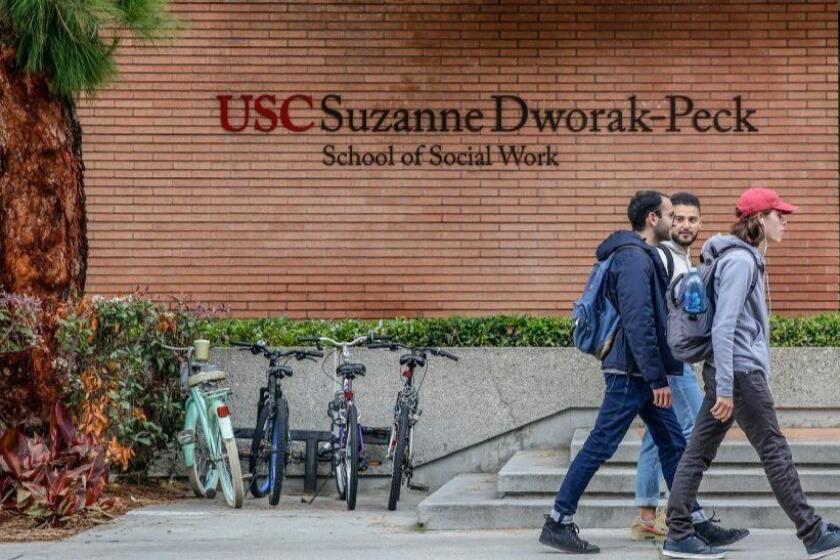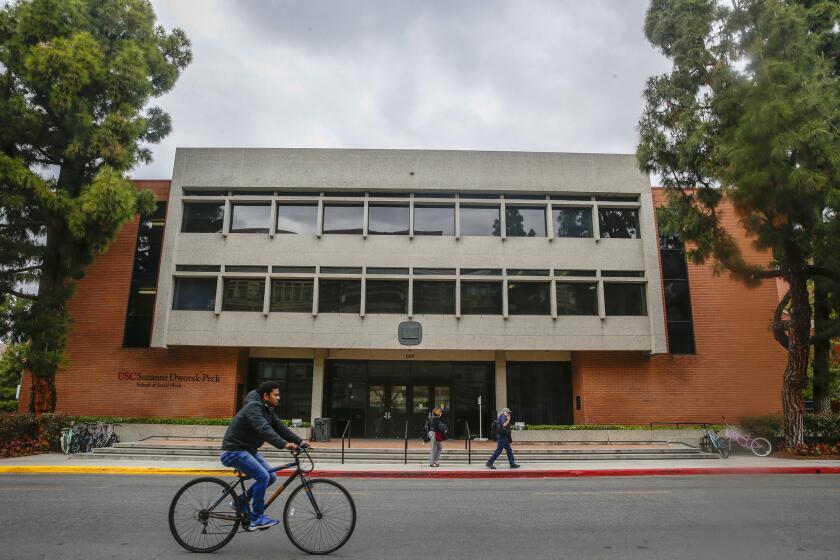USC peddled inferior online social work grad program to use as ‘cash cow,’ lawsuit alleges

- Share via
USC falsely marketed an online social-work degree program as equal to its respected on-campus offering, using it as a “cash cow” to lure in students unaware of the difference, a class-action lawsuit filed Thursday alleges.
The complaint filed in Los Angeles County Superior Court alleges that USC did not inform students that many components of the online master’s of social work degree are outsourced to a for-profit education company, 2U Inc., and that USC splits the tuition revenue with its publicly traded partner.
Although USC has marketed the online option as “the same” as the on-campus counterpart, the virtual program’s instructors, curriculum, internship placement and other services have been different — and inferior, the lawsuit asserts.
The Suzanne Dworak-Peck School of Social Work presents itself as “champions” for social justice, the lawsuit says but asserts the reality is different: “USC appears to have sacrificed these goals for the promise of immediate gains of partnering with a for-profit corporation in a scheme to maximize its own revenue at the expense of its students.”
USC said in a statement that it would “review the lawsuit in detail when we receive it.”
2U, although not a defendant in the complaint, said it had reviewed the accusations and its internal records “clearly show that the allegations are without merit.”
USC pushed back on the notion that it offered separate instruction to virtual students: “The school has one MSW program accredited by the Council on Social Work Education and delivered through on-campus and online options,” according to a statement.
USC also said it had overhauled its social work degree to be more affordable, slashing tuition by 25% in 2022. And for much of the last year, the school has been run by the dean of USC’s pharmacy school, Vassilios Papadopoulos, who has worked to make it more financially sustainable. Reforms include greater oversight over academics affairs, curriculum and student wellness.
One of the lead plaintiffs in the case, Stephanie Luna, said she felt “betrayed” when she learned last fall about differences between the online and on-campus programs, which were reported by The Times and the Wall Street Journal. The court filing accuses USC of deceptive advertising, unjust enrichment, fraudulent conduct and violations of state civil rights law.
A decade ago, USC was looking for a way into online education, which promised a gush of new tuition dollars without the expense of additional dorms and classrooms.
“I felt hurt that a university like USC — very prestigious, well-known — would knowingly use deceitful recruitment tactics to target students going into a profession that is meant to help communities that are oftentimes marginalized,” said Luna, who graduated in May 2021.
The lawsuit is the latest controversy to hit the social work school, which has been roiled by tumult and scandal in recent years. But the program was once considered a USC success story, with its visionary embrace of digital learning.
The longtime dean of USC’s social work program, Marilyn Flynn, launched the online effort in 2010. An early win was enrolling then-Rep. Karen Bass in the master’s program with free tuition while she served in Congress, proving that working professionals at all levels could participate.
“As a top research university, we have a meaningful role to play in the online education revolution. And I think we have demonstrated that,” Flynn told a campus publication in 2015.
The venture with 2U made USC’s social work school the largest in the country, with the student body growing from about 900 in 2010 to 3,500 in 2016. Tuition climbed to $115,000 by 2021.
But the surge in students — and with that, a gush of revenue — did not pan out as Flynn and her colleagues hoped.
Hiring instructors and staff proved costly and, the lawsuit alleges, their quality is not the same as those working in the on-campus program. An almost entirely different group of instructors, who do not otherwise work for USC and are not part of the “world-class” permanent research faculty, conduct the online instruction, the lawsuit alleges.
Other problems began to mount. USC signed up for pricey office space in a downtown L.A. high-rise. More affordable master’s degree programs came on the market, including Cal State Northridge’s two-year online program, which charges $46,000.
USC pushed to fill online classes with more students, which led to the admission of less-qualified students and aggressive recruiting practices — which further diminished the learning experience and the social work program’s overall reputation, The Times has reported.
The lawsuit highlights alleged recruiting practices, which it calls “reverse redlining” — targeting people by race, age, gender and other characteristics deemed most likely to accept an admission offer. The training material allegedly included graphics that depict a Black woman labeled “Needy Nelly” who had trouble with the application, needed “high touch” hand-holding, and was rated as the most likely to enroll.
“Confirmed Carmen,” a Latina, was also rated with a high probability for enrollment. But “Money Molly” — a “very intelligent” white woman — was considered a tough recruit.
2U, in its statement, said it never developed those depictions in its marketing or recruiting operations. “We are appalled by the offensive marketing personas described in the complaint,” the statement said, adding that its work is “consistent with high ethical standards and applicable regulations.”
Attorneys for the plaintiffs said they stand by the allegations in the complaint.
Luna, one of the plaintiffs, said such tactics appalled her as a Latina who is the first in her family to attend college. She said she chose USC because it offered a part-time program she could complete while continuing to work. She said she expressed concern about affordability but was told by the admission counselor — who she said she did not know was a 2U employee — that scholarships and loans were available, and she was certain to be accepted. Her confidence buoyed, Luna enrolled in May 2019.
But Luna said she soon began to feel uneasy. She was not granted either of two scholarships she applied for and had to take out more than $100,000 in loans. A summer “internship” fell short, she said, by failing to provide one-on-one training. The instruction was disjointed, with lectures often not aligned with the reading and video material assigned for the class, she said.
Luna, who works at UCLA as a case manager for students in distress, said, “In retrospect, if I could do it all over again, I would not have chosen to go to USC.”
Frustrations with the overall direction of USC’s social work program erupted in June 2018, when faculty members issued a no-confidence vote over then-dean Flynn’s leadership, leading to her ouster.
USC’s social work school, the largest in the world and one of the oldest in the nation, might be forced to lay off nearly half its staff and eliminate the vast majority of its part-time teaching positions following the revelations of severe budget problems that began under a former dean.
By 2018, USC’s social work school was running an annual deficit of $21 million, according to courtroom testimony this year. “Our expenses had exceeded the revenue we got by enrollment,” testified John Clapp, who took over as interim dean after Flynn departed.
In 2019, as the fiscal crisis at the social work school mounted, USC embarked on a series of cost-cutting measures, including layoffs.
“We’re still reeling from it,” Clapp testified regarding the fiscal crisis. This fall, tuition will still be $20,000 less than that charged in 2021.
It’s unclear how much money the social work program generates for 2U, which runs several online degrees with USC. In the fiscal year that ended in June 2021, the most recent year available, USC sent nearly $80 million to 2U for its share of student tuition revenue.
The cash crunch at the social work school also played a role in one of the most high-profile scandals at USC. With a mounting deficit, Flynn looked to government contracts as one way to boost her school’s sagging finances. Federal prosecutors allege she turned to one of Los Angeles County’s most powerful lawmakers, Supervisor Mark Ridley-Thomas, to help secure government contracts.
Full coverage of Mark Ridley-Thomas, his son and the USC School of Social Work.
County contracts were “important for the survival of the school,” Clapp said, and would help “make up our fiscal deficit.”
Federal prosecutors accused Flynn and Ridley-Thomas of being in a corrupt conspiracy, whereby Flynn offered the lawmaker a host of benefits to his son — including a job, scholarship and $100,000 funneled through the university to his son’s nonprofit — in exchange for the politician’s support and vote on contracts and initiatives.
Last year, Flynn pleaded guilty to one federal count of bribery in connection with the $100,000 payment.
In March, Ridley-Thomas was convicted of seven felonies in connection with the bribery and conspiracy scheme to route money through USC while voting on a contract amendment sought by Flynn.
Both are scheduled to be sentenced this summer.
Last summer, then-dean Sarah Gehlert, who joined USC in 2020 and inherited the problems of her predecessor, stepped down. Gehlert was credited with restructuring the program to reduce student debt, according to a letter announcing her departure. Since then, the school has been led on an interim basis by Papadopoulos, dean of USC’s pharmacy school.
In a statement, USC said Papadopoulos “has advanced several initiatives to place the school on firmer financial footing.”
“He has created new offices of oversight in academic affairs, curriculum, student wellness, inter-professional education and workforce development, and improved morale among faculty and staff,” USC added.
Papadopoulos is expected to remain in the post for the near future. USC plans to begin its search for a permanent dean this summer.
More to Read
Updates
10:11 p.m. May 12, 2023: This article was updated to reflect comments from 2U.
Sign up for Essential California
The most important California stories and recommendations in your inbox every morning.
You may occasionally receive promotional content from the Los Angeles Times.


















